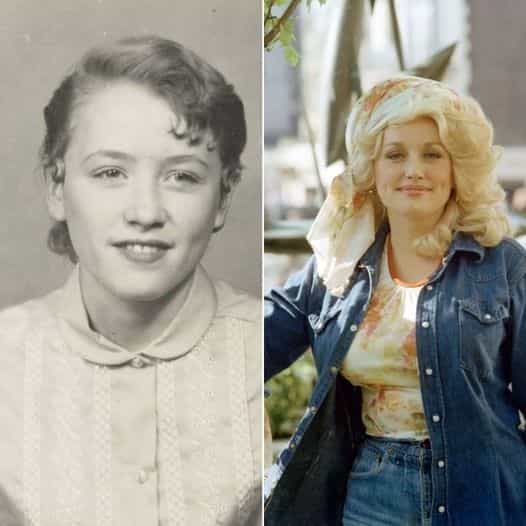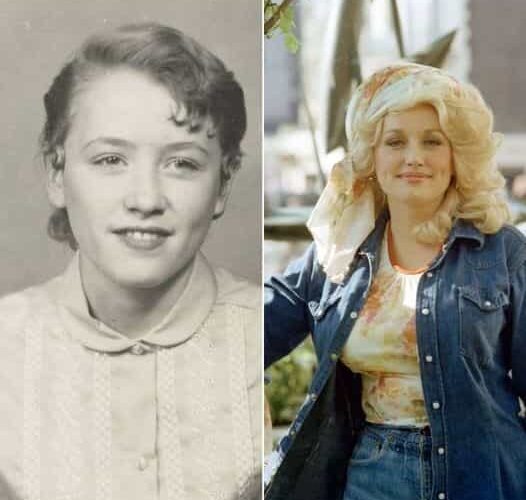The Tragic Life Story Of Dolly Parton

Dolly Parton is celebrated worldwide as the “Queen of Country Music,” yet beneath her sparkly stage costumes, larger-than-life hair, and famous smile lies a story filled with trials, sacrifices, and heartbreak.
Dolly’s rise to fame was far from easy; it was filled with financial hardship, personal loss, and difficult sacrifices. Her journey from a small Tennessee town to becoming a global icon is a true testament to resilience, hard work, and a passion for her craft.
Early Years in Poverty: Life in the Smoky Mountains
Dolly Rebecca Parton was born on January 19, 1946, in Locust Ridge, Tennessee, as one of twelve children. Growing up, Dolly’s family faced severe poverty, a reality that deeply influenced her childhood and ultimately her music. Her father, Robert Lee Parton, worked tirelessly as a sharecropper and construction worker, yet the family’s finances remained a daily struggle. They lived in a small one-room cabin without running water or electricity, and Dolly often wore clothes stitched together from old flour sacks. This hardship fueled her ambition and instilled in her a fierce determination to provide a better life for herself and her family.
Dolly’s mother, Avie Lee, provided a loving foundation and nurtured her daughter’s talent, encouraging her to sing at the local church and family gatherings. These early performances would form the bedrock of Dolly’s career, giving her the confidence to pursue music professionally.
Building a Career in a Male-Dominated Industry
At only 13 years old, Dolly Parton recorded her first single, “Puppy Love,” and by the time she was out of high school, she was ready to make the move to Nashville. With little money and no industry connections, she faced countless rejections. Even when she finally secured a spot on “The Porter Wagoner Show” in the late 1960s, which catapulted her into stardom, the arrangement was rife with conflict. Porter Wagoner, a well-established name in country music, was initially resistant to Dolly’s rise to prominence and reluctant to let her take creative control over her music. Dolly persisted and eventually left the show in 1974 to pursue a solo career, risking her future and a costly lawsuit that could have derailed her ambitions.
Her success as a solo artist would come, but not without ongoing struggles in an industry dominated by male executives who doubted a young woman from rural Tennessee could achieve true success.
Personal Sacrifices and Struggles with Depression
Dolly’s relentless pursuit of fame often came at a personal cost. As her career skyrocketed, Dolly’s marriage to her husband, Carl Dean, grew strained. The couple had married in 1966, long before she became a household name, and Dean preferred a quiet, private life, far from the limelight. Dolly, on the other hand, was thrust into an all-consuming career that left her with little time for her husband. Her commitment to her career ultimately led the couple to live mostly separate lives.
Throughout her life, Dolly also struggled with her decision not to have children. Though she and Carl had originally planned on raising a family, health issues prevented her from doing so, which caused Dolly deep emotional pain and a period of severe depression in the late 1980s. In interviews, she has admitted to grappling with suicidal thoughts during this time, revealing that her internal struggles nearly became overwhelming. Her music, faith, and a sense of responsibility to her fans ultimately kept her grounded, and she has credited music as her therapy, allowing her to express the sadness and heartbreak she felt privately.
Health Challenges and Ongoing Battles
Throughout her life, Dolly has also faced various health issues, many of which she has kept private. In the 1980s, she battled weight problems and issues related to exhaustion from her grueling touring and filming schedules. Dolly later developed endometriosis, a painful condition that forced her to undergo a partial hysterectomy. This surgery put an end to her dreams of motherhood, leading to a painful emotional recovery.
In recent years, Dolly has opened up about her ongoing health issues, including problems with her spine. Her busy schedule and demanding performances have taken a toll on her body, but she remains committed to her career and has often downplayed her pain, focusing instead on her love for performing and connecting with her fans.
The Untold Emotional Burden of a Lifelong Icon
Despite the joy she brings to her fans, Dolly has faced heartbreak, even when it comes to the people she loves most. One of the hardest losses Dolly faced was the death of her brother, Randy, in 2021. Randy, who was also musically talented, worked closely with Dolly over the years, and his death was a painful reminder of the family she has lost throughout her journey. Dolly has also grieved the loss of her parents, both of whom passed away in the 2000s.
Dolly has long carried the emotional burden of being the “rock” for her family, financially supporting them and ensuring their wellbeing. Yet, she has often revealed that her greatest dream was for her parents to live to see her reach her full potential. Her song “Coat of Many Colors” remains an ode to her mother, capturing both the beauty and the pain of their shared past.
The Power of Generosity: Turning Pain into Philanthropy
Dolly’s challenging experiences have influenced not only her music but also her philanthropic efforts. She has poured her wealth and resources into countless initiatives, including her beloved Dollywood Foundation, which supports literacy programs across the country. Her Imagination Library, which provides free books to children worldwide, has distributed over 100 million books and continues to expand, embodying Dolly’s commitment to creating a better world for future generations.
During the COVID-19 pandemic, Dolly also made headlines by donating $1 million to research efforts, leading to the development of a vaccine. Her generosity and genuine love for others have helped her transform personal pain into acts of kindness that benefit communities worldwide.
Dolly’s Resilience: A Legacy of Hope and Perseverance
Dolly Parton’s life is a story of triumph over adversity. While she may be known for her upbeat persona and uplifting music, her life has been far from easy. Her journey is a testament to resilience, illustrating that despite hardship, one can still find success, love, and happiness. Dolly continues to perform, write music, and share her life story, inspiring millions across the globe.
Her fans are drawn to her because she embodies authenticity and a willingness to share both the highs and lows of her life. Through her music, philanthropy, and unwavering spirit, Dolly Parton’s legacy will endure, reminding the world that beauty, grace, and strength can emerge from even the most challenging circumstances.
FAQ: The Tragic Life Story of Dolly Parton
1. What were Dolly Parton’s early life challenges?
Dolly Parton grew up in severe poverty in a one-room cabin in rural Tennessee, part of a large family with limited resources. This background instilled in her a strong work ethic and fueled her ambitions, but also meant she faced significant financial hardship growing up.
2. How did Dolly Parton get her start in country music?
Dolly began performing in church and at family gatherings as a child. She recorded her first single, “Puppy Love,” at age 13 and moved to Nashville after high school, where she faced rejection before eventually securing a spot on The Porter Wagoner Show, which launched her to national fame.
3. Why didn’t Dolly Parton have children?
Health issues, including endometriosis, led to a partial hysterectomy, which prevented Dolly from having children. She has expressed pain over this loss, as she and her husband, Carl Dean, originally wanted children.
4. Did Dolly Parton suffer from depression?
Yes, Dolly experienced a period of deep depression in the 1980s. She has opened up about having suicidal thoughts during this time, attributing her recovery to her faith, music, and sense of responsibility to her fans.
5. How has Dolly Parton’s health impacted her career?
Dolly has faced various health challenges, including weight issues, exhaustion, endometriosis, and spinal problems. Despite these, she has continued performing, maintaining her upbeat persona and commitment to her fans.
6. How has Dolly Parton contributed to philanthropy?
Dolly founded the Dollywood Foundation and Imagination Library, providing free books to children worldwide. She has supported numerous causes, including donating $1 million to COVID-19 vaccine research.
7. How has loss impacted Dolly Parton?
Dolly has experienced significant personal losses, including the deaths of her brother Randy and her parents. Despite these, she has remained strong, channeling her emotions into her music and philanthropic efforts.
8. What is Dolly Parton’s legacy?
Dolly Parton’s legacy is one of resilience, generosity, and inspiration. She has transformed her hardships into motivation for success, becoming a global icon in music, an advocate for education, and a beloved philanthropist.

